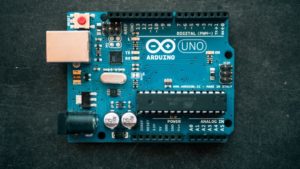Studying Computer Science at university can be intense but rewarding. Bath’s Computer Science courses span a wide range of fields, from computational mathematics to software engineering and hardware systems. Students at Bath learn new computing techniques and refine their analytical skills, and the above-average starting salary for Bath CompSci grads is definitely a bonus!
Bath offers 3 main degree courses to choose from in the Department of Computer Science:
- Computer Science
- Computer Science and Artificial Intelligence
- Computer Science and Maths
There is also the option to do a placement year or study year abroad for each of them, adding on an extra year of study to your degree. I opted for the straight Computer Science with Placement course, but some units are shared between all three degree options, so all students learn the key concepts.
You should check the University website for the most up-to-date course information as the following details are based on my experience and are subject to change from year to year.
Overview & Assessment
In my first year, I had 4 modules in my first semester and 5 in my second (the full list of first-year units can be found here).
The grades for each of my modules was weighted more on the exam relative to the courseworks set. For example, my Principles of Programming 2 unit was weighted 25% on two courseworks, and 50% on the end-of-semester exam. Approximately 40% of the assessment will be coursework over the duration of the course. First-year grades do not count towards the final degree classification, but second and final year grades contribute 32% and 68% respectively. (https://www.bath.ac.uk/courses/undergraduate-2022/computer-science/bsc-computer-science/).
Each module typically had 2 courseworks set each semester with an exam. However, my Mathematics modules had 4 problem sheets each semester along with the end-of-semester exam.
Our coursework was assessed in a variety of methods: for our Systems Architecture unit we had to write an essay on the effects of scheduling resources in computer systems, and for our Principles of Programming unit we had to submit coded solutions to problems in various coding languages (either Python, Java or C).
We also had to work through the aforementioned problem sheets for our Mathematics module, and there were also two Arduino projects we had to devise and develop, which was a practical aspect I really enjoyed.

Lectures & Learning
Due to the pandemic, our lectures were online this year. I typically had 4 Zoom lectures on Tuesdays, 2 on Wednesdays, and 5 on Thursdays. On Mondays, I had in-person teaching sessions and Fridays were days off for me. We didn’t have any tutorials or laboratory sessions but hopefully, this will change next year!
The online lectures consisted of our lecturers explaining concepts with the aid of a PowerPoint slideshow, along with a Q&A session at the end. We also had one-on-one tutor sessions regularly if students needed help with coursework, and there were also placement sessions every week. Timetabled contact hours are typically around 15 to 20 hours a week during the first year.
There is also a strong emphasis on independent learning; in addition to contact hours, the university expects you to undertake super-curricular learning and research. This can include reading books and journals, working on projects, revision or preparing assignments. This focus on independent learning becomes greater with each year of your course. Success is dependent on how much outside learning you do – doing the bare minimum may get you a pass but not necessarily a first-class honours.
Thoughts
I really enjoyed my first year studying Computer Science at Bath. Though there were times where I stayed up until 4am finishing an assignment or skipped meals revising for an exam (please do not do this!), I found it incredibly rewarding. I can now say that I’ve coded a Naïve Bayes algorithm in Python for my AI module, and collaboratively developed a sleep-tracking and productivity app as part of a team for my Software Processes and Modelling unit.
I’ve improved upon my technical skillset and gained experience coding in a new language (though coding in C is equivalent to performing a lobotomy on yourself, but that’s just my opinion) whilst also having a deeper understanding of the more theoretical fields, like computer systems and machine learning.
In terms of learning during the pandemic, I’d say it was a unique experience. I’m not sure if I think having lectures through Zoom calls is less beneficial to our learning, but I did start to get tired of sitting in my room all day staring at my laptop screen. I remember people turning up to Zoom lectures less and less in our second semester. Big shoutout to our lecturers though – they consistently made sure that our learning experience was just the same as any other year.
The only downside was the burnout I experienced during semester two. Late nights and early mornings do start to take their toll on the body much sooner than you expect. It got to the point where if I wasn’t studying, I would be sleeping, and if I wasn’t sleeping, I’d be studying (and maybe going out). The workload is tough. If you’re completely new to computer science, it will be hard but it’s definitely manageable. Just remember that your lecturers are always there to help, and even your fellow students can share their knowledge too.
Computer Science is an engaging and compelling field with potential for everyone. If you’re thinking about studying Computer Science at Bath, I’d highly recommend it. The key thing is that you have a genuine interest and passion for the subject, otherwise it’ll be difficult to stay motivated to study. My first year of Computer Science at Bath has been enjoyable, and I’m excited to see where second-year leads.
Respond
